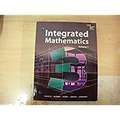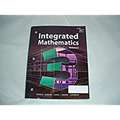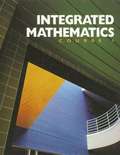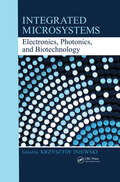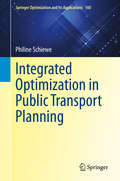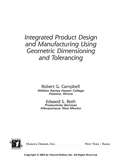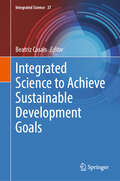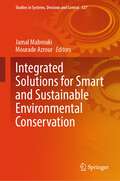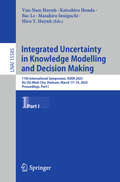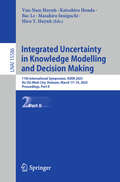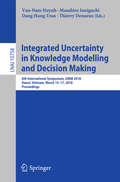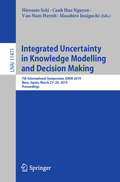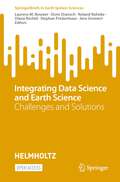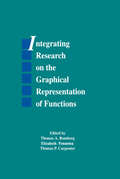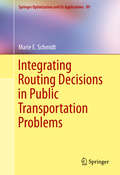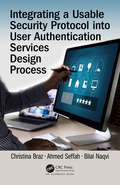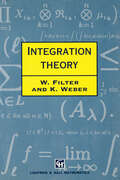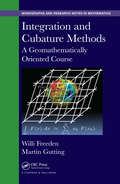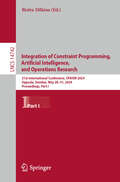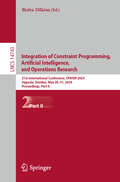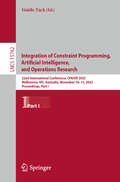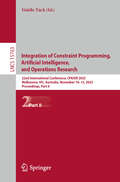- Table View
- List View
Integrated Mathematics 2, Volume 2
by Timothy D. Kanold Edward B. Burger Juli K. DixonNIMAC-sourced textbook
Integrated Mathematics 3 (2015 Edition)
by Timothy D. Kanold Edward B. Burger Juli K. DixonNIMAC-sourced textbook
Integrated Mathematics 3, Volume 2
by Timothy D. Kanold Edward B. Burger Juli K. DixonNIMAC-sourced textbook
Integrated Mathematics, 1
by Timothy D. Kanold Edward B. Burger Juli K. DixonNIMAC-sourced textbook
Integrated Mathematics: Course 1
by Richard J. Klutch Elden B. Egbers Douglas R. Bumby Donald W. CollinsThis book is all about operations, numbers, algebra, formulas, inequalities, geometry, measurement, polynomials, factoring and probability.
Integrated Mathematics: Course 3 (Second Edition)
by Ann Xavier Gantert Edward P. KeenanThis Second Edition is offered to help students comprehend, master, and enjoy mathematics from an integrated point of view.
Integrated Microsystems: Electronics, Photonics, and Biotechnology (Devices, Circuits, and Systems)
by Iniewski KrzysztofAs rapid technological developments occur in electronics, photonics, mechanics, chemistry, and biology, the demand for portable, lightweight integrated microsystems is relentless. These devices are getting exponentially smaller, increasingly used in everything from video games, hearing aids, and pacemakers to more intricate biomedical engineering and military applications. Edited by Kris Iniewski, a revolutionary in the field of advanced semiconductor materials, Integrated Microsystems: Electronics, Photonics, and Biotechnology focuses on techniques for optimized design and fabrication of these intelligent miniaturized devices and systems. Composed of contributions from experts in academia and industry around the world, this reference covers processes compatible with CMOS integrated circuits, which combine computation, communications, sensing, and actuation capabilities. Light on math and physics, with a greater emphasis on microsystem design and configuration and electrical engineering, this book is organized in three sections—Microelectronics and Biosystems, Photonics and Imaging, and Biotechnology and MEMs. It addresses key topics, including physical and chemical sensing, imaging, smart actuation, and data fusion and management. Using tables, figures, and equations to help illustrate concepts, contributors examine and explain the potential of emerging applications for areas including biology, nanotechnology, micro-electromechanical systems (MEMS), microfluidics, and photonics.
Integrated Optimization in Public Transport Planning (Springer Optimization and Its Applications #160)
by Philine SchieweThis book is one of the first to include an extensive discussion of integrated public transport planning. In times of growing urban populations and increasing environmental awareness, the importance of optimizing public transport systems is ever-developing. Three different aspects are presented: line planning, timetabling, and vehicle scheduling. Classically, challenges concerning these three aspects of planning are solved sequentially. Due to their high interdependence, the author presents a clear and detailed analysis of innovative, integrated models with accompanied numerical experiments performed to assess, and often support, the benefits of integration. The book will appeal to a wide readership ranging from graduate students to researchers.
Integrated Product Design and Manufacturing Using Geometric Dimensioning and Tolerancing
by Bob CampbellThis book addresses the preparation and application of design layout analyses with concurrent engineering teams in six steps that capture design intent and add value to design process. It offers tools for eliminating costly trial-and-error approaches and deliver economically viable products. The authors discuss product design techniques that allevi
Integrated Science to Achieve Sustainable Development Goals (Integrated Science #37)
by Beatriz CasaisThe book &‘Integrated Science to achieve Sustainable Development Goals&’ debates how different fields of study can confront or mitigate problems or contribute together to the development of society. In brief, it is a book about the interdisciplinarity of knowledge surrounding the topics in society that are involved in the world development agenda. There is an increasing recognition of the importance of achieving the sustainable development goals (SDGs) set in the UN agenda 2030. The book seeks to address the need for the integration of multidisciplinary fields of knowledge to achieve the seventeen SDGs. The book was developed with contributions from established and well-known scholars in different fields. It is interdisciplinary in nature and international in scope, intending to bring out a collection of state-of-the-art/cutting-edge knowledge on policies to achieve the 17 SDGs as well as a range of actionable recommendations for future developments in the different fields with the purpose of addressing the Agenda 2030. The integration of different disciplines (including sociology, health, education, psychology, business, economics, political science, environmental studies and urban planning) in a complex problem like societal development gives this book the challenge to be an authoritative tool with guidelines for the entire community and for policymakers as well. Each chapter presents the state of the art of a topic considered important to achieve SDGs. The authors explain how their field contributes to the achievement of one or more SDGs, including the main theories and examples of empirical evidence that may guide society in using such knowledge to contribute to societal impact.
Integrated Solutions for Smart and Sustainable Environmental Conservation (Studies in Systems, Decision and Control #527)
by Mourade Azrour Jamal MabroukiResource depletion and ecological risks are more than ever at the heart of societal and economic debates. In the 1970s, the developed countries saw the Fordist growth regime crumble in parallel with the growing awareness of the ecological issue. Since the first industrial revolutions, technological dynamics have been the cause of many environmental problems, and there is a consensus on the diagnosis. Integrated technologies reduce resource use and/or pollution at source by using cleaner production methods. This generally leads to a reduction in the by-products, energy inputs and resources used by companies to produce goods. Integrated production technologies reduce negative environmental impacts at source by substituting or modifying cleaner technologies. Examples of integrated, or cleaner, production technologies are the recirculation of materials, the use of environmentally friendly materials (such as the substitution of water for organic solvents), etc. However, the implementation of integrated production technologies is often hampered by obstacles related to cost, coordination and skill inertia problems and to the productive organisation of companies. In addition to the high investment costs of new integrated technologies, additional barriers may emerge depending on the nature of the environmental problem and the type of environmental regulation in question.
Integrated Uncertainty in Knowledge Modelling and Decision Making: 11th International Symposium, IUKM 2025, Ho Chi Minh City, Vietnam, March 17–19, 2025, Proceedings, Part I (Lecture Notes in Computer Science #15585)
by Van-Nam Huynh Masahiro Inuiguchi Bac Le Katsuhiro Honda Hieu T. HuynhThis two-volume set constitutes the proceedings of the 11th International Symposium on Integrated Uncertainty in Knowledge Modelling and Decision Making, IUKM 2025, held in Ho Chi Minh City, Vietnam, during March 17-19, 2025. The 55 full papers in this book were carefully reviewed and selected from 116 submissions. They were organized in topical sections as follows: Part I: Invited Talks; Machine Learning; Pattern Recognition and Data Analysis; Applications. Part II: Uncertainty Management and Decision Making; Optimization and Statistical Methods; Applications.
Integrated Uncertainty in Knowledge Modelling and Decision Making: 11th International Symposium, IUKM 2025, Ho Chi Minh City, Vietnam, March 17–19, 2025, Proceedings, Part II (Lecture Notes in Computer Science #15586)
by Van-Nam Huynh Masahiro Inuiguchi Bac Le Katsuhiro Honda Hieu T. HuynhThis two-volume set constitutes the proceedings of the 11th International Symposium on Integrated Uncertainty in Knowledge Modelling and Decision Making, IUKM 2025, held in Ho Chi Minh City, Vietnam, during March 17-19, 2025. The 55 full papers in this book were carefully reviewed and selected from 116 submissions. They were organized in topical sections as follows: Part I: Invited Talks; Machine Learning; Pattern Recognition and Data Analysis; Applications. Part II: Uncertainty Management and Decision Making; Optimization and Statistical Methods; Applications.
Integrated Uncertainty in Knowledge Modelling and Decision Making: 6th International Symposium, IUKM 2018, Hanoi, Vietnam, March 15-17, 2018, Proceedings (Lecture Notes in Computer Science #10758)
by Van-Nam Huynh Thierry Denoeux Masahiro Inuiguchi Dang Hung TranThis book constitutes the refereed proceedings of the 6th International Symposium on Integrated Uncertainty in Knowledge Modelling and Decision Making, IUKM 2018, held in Hanoi, Vietnam, in March 2018.The 39 revised full papers presented in this book were carefully reviewed and selected from 76 initial submissions. The papers are organized in topical sections on uncertainty management and decision support; clustering and classification; machine learning applications; statistical methods; and econometric applications.
Integrated Uncertainty in Knowledge Modelling and Decision Making: 7th International Symposium, IUKM 2019, Nara, Japan, March 27–29, 2019, Proceedings (Lecture Notes in Computer Science #11471)
by Van-Nam Huynh Masahiro Inuiguchi Hirosato Seki Canh Hao NguyenThis book constitutes the refereed proceedings of the 7th International Symposium on Integrated Uncertainty in Knowledge Modelling and Decision Making, IUKM 2019, held in Nara, Japan, in March 2019.The 37 revised full papers presented were carefully reviewed and selected from 93 submissions. The papers deal with all aspects of uncertainty modelling and management and are organized in topical sections on uncertainty management and decision support; econometrics; machine learning; machine learning applications; and statistical methods.
Integrating Data Science and Earth Science: Challenges and Solutions (SpringerBriefs in Earth System Sciences)
by Laurens M. Bouwer Doris Dransch Roland Ruhnke Diana Rechid Stephan Frickenhaus Jens GreinertThis open access book presents the results of three years collaboration between earth scientists and data scientist, in developing and applying data science methods for scientific discovery. The book will be highly beneficial for other researchers at senior and graduate level, interested in applying visual data exploration, computational approaches and scientifc workflows.
Integrating Research on the Graphical Representation of Functions (Studies in Mathematical Thinking and Learning Series)
by Thomas P. Carpenter Elizabeth Fennema Thomas A. RombergThis volume focuses on the important mathematical idea of functions that, with the technology of computers and calculators, can be dynamically represented in ways that have not been possible previously. The book's editors contend that as result of recent technological developments combined with the integrated knowledge available from research on teaching, instruction, students' thinking, and assessment, curriculum developers, researchers, and teacher educators are faced with an unprecedented opportunity for making dramatic changes. The book presents content considerations that occur when the mathematics of graphs and functions relate to curriculum. It also examines content in a carefully considered integration of research that conveys where the field stands and where it might go. Drawing heavily on their own work, the chapter authors reconceptualize research in their specific areas so that this knowledge is integrated with the others' strands. This model for synthesizing research can serve as a paradigm for how research in mathematics education can -- and probably should -- proceed.
Integrating Routing Decisions in Public Transportation Problems
by Marie E. SchmidtThis book treats three planning problems arising in public railway transportation planning: line planning, timetabling, and delay management, with the objective to minimize passengers' travel time. While many optimization approaches simplify these problems by assuming that passengers' route choice is independent of the solution, this book focuses on models which take into account that passengers will adapt their travel route to the implemented planning solution. That is, a planning solution and passengers' routes are determined and evaluated simultaneously. This work is technically deep, with insightful finding regarding complexity and algorithmic approaches to public transportation problems with integrated passenger routing. It is intended for researchers in the fields of mathematics, computer science, or operations research, working in the field of public transportation from an optimization standpoint. It is also ideal for students who want to gain intuition and experience in doing complexity proofs and designing polynomial-time algorithms for network problems. The book models line planning, timetabling and delay management as combined design and routing problems on networks. In a complexity analysis, the border between NP-hard and polynomially solvable problems is illustrated. Based on that, the insights gained are used to develop solution approaches for the considered problems. Besides integer programming formulations, a heuristic method iterating planning and routing step is proposed to solve the problems.
Integrating a Usable Security Protocol into User Authentication Services Design Process
by Ahmed Seffah Christina Braz Bilal NaqviThere is an intrinsic conflict between creating secure systems and usable systems. But usability and security can be made synergistic by providing requirements and design tools with specific usable security principles earlier in the requirements and design phase. In certain situations, it is possible to increase usability and security by revisiting design decisions made in the past; in others, to align security and usability by changing the regulatory environment in which the computers operate. This book addresses creation of a usable security protocol for user authentication as a natural outcome of the requirements and design phase of the authentication method development life cycle.
Integration Theory (Chapman And Hall Mathematics Ser. #454)
by K. WeberThis introductory text acts as a singular resource for undergraduates learning the fundamental principles and applications of integration theory.Chapters discuss: function spaces and functionals, extension of Daniell spaces, measures of Hausdorff spaces, spaces of measures, elements of the theory of real functions on R.
Integration and Cubature Methods: A Geomathematically Oriented Course (Chapman & Hall/CRC Monographs and Research Notes in Mathematics)
by Willi Freeden Martin GuttingIn industry and economics, the most common solutions of partial differential equations involving multivariate numerical integration over cuboids include techniques of iterated one-dimensional approximate integration. In geosciences, however, the integrals are extended over potato-like volumes (such as the ball, ellipsoid, geoid, or the Earth) and their boundary surfaces which require specific multi-variate approximate integration methods. Integration and Cubature Methods: A Geomathematically Oriented Course provides a basic foundation for students, researchers, and practitioners interested in precisely these areas, as well as breaking new ground in integration and cubature in geomathematics.
Integration of Constraint Programming, Artificial Intelligence, and Operations Research: 21st International Conference, CPAIOR 2024, Uppsala, Sweden, May 28–31, 2024, Proceedings, Part I (Lecture Notes in Computer Science #14742)
by Bistra DilkinaThis book constitutes the proceedings of the 21st International Conference on the Integration of Constraint Programming, Artificial Intelligence, and Operations Research, CPAIOR 2024, held in Uppsala, Sweden, during May 28–31, 2024. The 33 full papers and the 9 short papers presented in the proceedings were carefully reviewed and selected from a total of 104 submissions. The content of the papers focus on new techniques or applications in the area and foster the integration of techniques from different fields dealing with large and complex problems.
Integration of Constraint Programming, Artificial Intelligence, and Operations Research: 21st International Conference, CPAIOR 2024, Uppsala, Sweden, May 28–31, 2024, Proceedings, Part II (Lecture Notes in Computer Science #14743)
by Bistra DilkinaThis book constitutes the proceedings of the 21st International Conference on the Integration of Constraint Programming, Artificial Intelligence, and Operations Research, CPAIOR 2024, held in Uppsala, Sweden, during May 28–31, 2024.The 33 full papers and the 9 short papers presented in the proceedings were carefully reviewed and selected from a total of 104 submissions. The content of the papers focus on new techniques or applications in the area and foster the integration of techniques from different fields dealing with large and complex problems.
Integration of Constraint Programming, Artificial Intelligence, and Operations Research: 22nd International Conference, CPAIOR 2025, Melbourne, VIC, Australia, November 10–13, 2025, Proceedings, Part I (Lecture Notes in Computer Science #15762)
by Guido TackThis two-volume set LNCS 15762-15763 constitutes the proceedings of the 22nd International Conference on the Integration of Constraint Programming, Artificial Intelligence, and Operations Research, CPAIOR 2025, held in Melbourne, VIC, Australia, November 10–13, 2025.The 30 full papers and the 2 short papers presented in the proceedings were carefully reviewed and selected from a total of 68 submissions.The conference featured a masterclass and several joint invited talks that covered topics of interest at the intersection of constraint programming, artificial Intelligence, operations research, planning and scheduling, and knowledge representation.
Integration of Constraint Programming, Artificial Intelligence, and Operations Research: 22nd International Conference, CPAIOR 2025, Melbourne, VIC, Australia, November 10–13, 2025, Proceedings, Part II (Lecture Notes in Computer Science #15763)
by Guido TackThis two-volume set LNCS 15762-15763 constitutes the proceedings of the 22nd International Conference on the Integration of Constraint Programming, Artificial Intelligence, and Operations Research, CPAIOR 2025, held in Melbourne, VIC, Australia, November 10–13, 2025.The 30 full papers and the 2 short papers presented in the proceedings were carefully reviewed and selected from a total of 68 submissions.The conference featured a masterclass and several joint invited talks that covered topics of interest at the intersection of constraint programming, artificial Intelligence, operations research, planning and scheduling, and knowledge representation.

